Alan Didak opens up in a rare interview with Hamish McLachlan
He was the pin-up boy for the ‘rat pack’ and an incredible footballer on-field. Alan Didak reveals how Dane Swan was so successful - and thinks he might be the healthiest he’s ever been in shutdown.
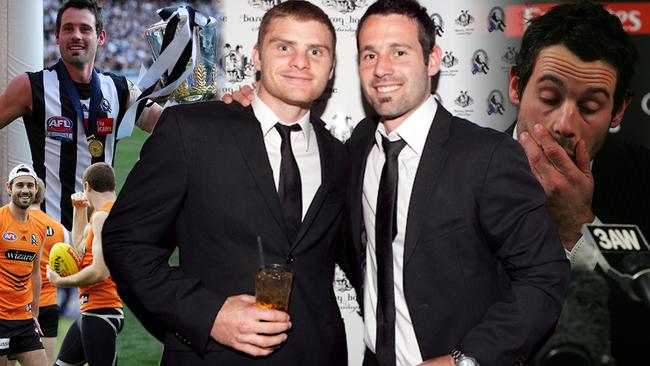
Dennis Cometti once quipped “Alan Didak was Stevie J before Stevie J was Stevie J”, referring to Didak’s rare, sublime football skills.
Didak is a Collingwood favourite, best and fairest and premiership player.
A loved member of the Magpies’ “Rat Pack” who had the odd indiscretion off the field, “Dids” says he was lucky to be allowed to stay at the club. He gives a rare interview to Hamish McLachlan.
ALAN DIDAK Q&A WITH HAMISH MCLACHLAN
Hamish McLachlan: Dids, Croatian-born parents. How much did your folks know about footy?
Alan Didak: Not too much when I first started playing, but from when I made my debut in the AFL, they slowly became experts like many parents! Now, when I ring back home there’ll always be a footy game blaring in the background. They absolutely love it.
HM: Your older brother played?
AD: He was actually a fair bit better than me in junior footy and I just followed in his footsteps. There were a couple of years there in under-12s and under-15s where he kicked over 100 goals in a season. He was a gun footballer, but just a bit lazy to make a life from it.
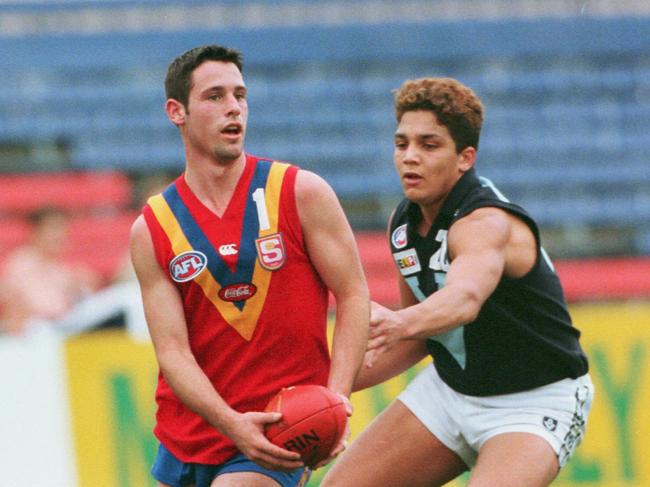
HM: When did you know you were going to be good enough to play at the highest
level?
AD: I really enjoyed it from a young age and I think I always wanted to make a living from it. When I was 16 or 17, I represented the country in the International Rules series over in Ireland. Around 90 per cent of that group looked like being drafted and I was on par with them. I was in high school playing for the Port Adelaide Magpies in the SANFL at the time as a teenager. When I made my league debut that year and wasn’t too far off the pace, I thought maybe I was good enough.
HM: An Adelaide boy — were you hoping to get drafted by Port and stay in SA?
AD: I was, but like most players with stars in their eyes, I was just desperate to be drafted full stop. I knew the odds were I’d have to leave Adelaide and I was glad when Collingwood read my name out. A big club, home games at the MCG, huge supporter base … it was hard not to be excited about it all.
Relive classic AFL matches from the 60s to today on KAYO SPORTS. New to Kayo? Get your 14-day free trial & start streaming instantly >
HM: Your first game was in 2001 — your 24th and your 49th games were in Grand Finals against the superpower of the time, the Brisbane Lions. Were you too young to realise how rare the Grand Final opportunities were?
AD: I was. I was ignorant to the privilege and the opportunity and was also maybe a bit expectant that I would get a Grand Final game in my career. To use an old cliche, you take it “week by week” and you just want to play the game and play as many games as you can at the highest level. I took it for granted in ’02 and ’03. I was 19 and 20 at the time, and I was under the illusion that it’d just happen every year. I thought we had the team to be able to do that. When we lost those and then went through a rebuilding phase, it dawned on me that I might never play in another. When we won the replay in 2010 it meant the world to me. Winning one, after losing two and drawing one was a massive relief.
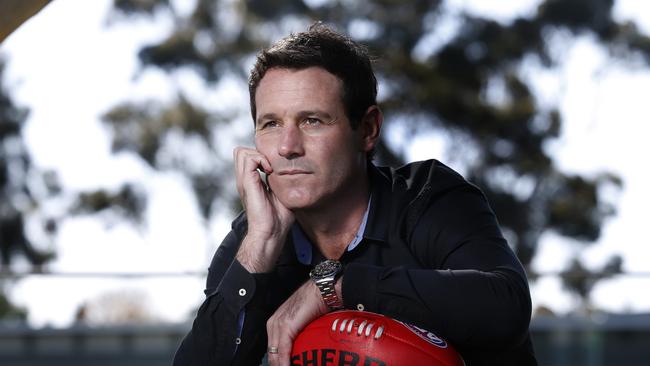
HM: Just going back to the Grand Finals in 2002 and ’03 — not many thought that the Pies’
list would make it to Grand Finals. Did that list outperform itself?
AD: Yeah, I think so. In 2000 we finished bottom, then we picked up Josh Fraser and the year after we finished third bottom, and then I was picked up as a low draft pick. You’d think you’d have to rebuild your side for at least four or five years to get back to playing deep into finals footy, but that list was just such a really tight-knit group. When you look at the list, we didn’t have too many superstars, maybe just a couple in “Bucks” and Chris Tarrant. We were a group of players who were clear on the roles we were asked to play, and a lot of the list had big hearts.
HM: In 2002 you almost did the impossible against the Lions.
AD: We almost pulled off a miracle against one of the greatest sides in the history of the game. That Pies list was a special group — I don’t think too many people rated us as players, or as a team, but internally we rated each other pretty highly, and we knew that the coaches had a good game plan, and we stuck to it, believing it would work. It very nearly won us the last game of the year.
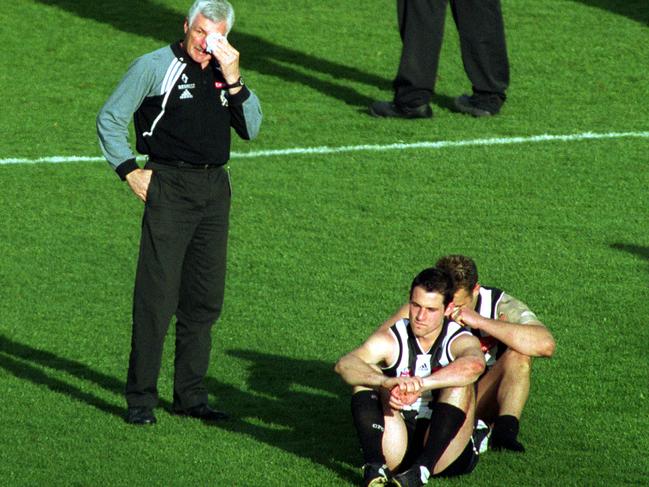
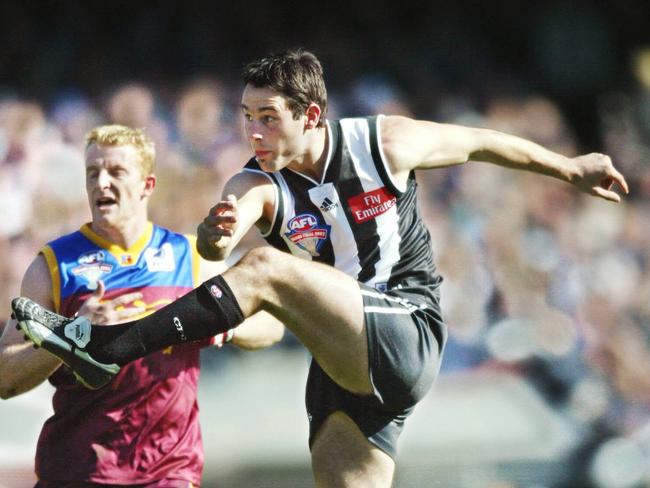
HM: Eight years later you did.
AD: Gee, we were lucky in 2010 … but for the bounce of the ball, there’s a big chance a few of us end up four-time losing grand finalists. It’s a fickle game. The ball bounced the wrong way for the Saints and Stephen Milne, and the right way for us. If the game went into extra time, St Kilda would have won their second flag. Most of our players were spent and St Kilda just took it to another level. A bounce and a replay …. you can get lucky.
MORE AFL NEWS:
Collingwood defender Lynden Dunn vows to push his surgically repaired knee to the limit
SACKED: Brendon Goddard reveals how he was sacked by the Bombers, maintains Essendon-34’s innocence
Adelaide players face investigation over alleged breach of AFL training protocols
HM: You end up becoming a premiership player, but you were lucky to be playing at all,
weren’t you?
AD: In Round 19, I tore my pec against the Crows in a unique situation … I tackled! You know me, I didn’t tackle very often.
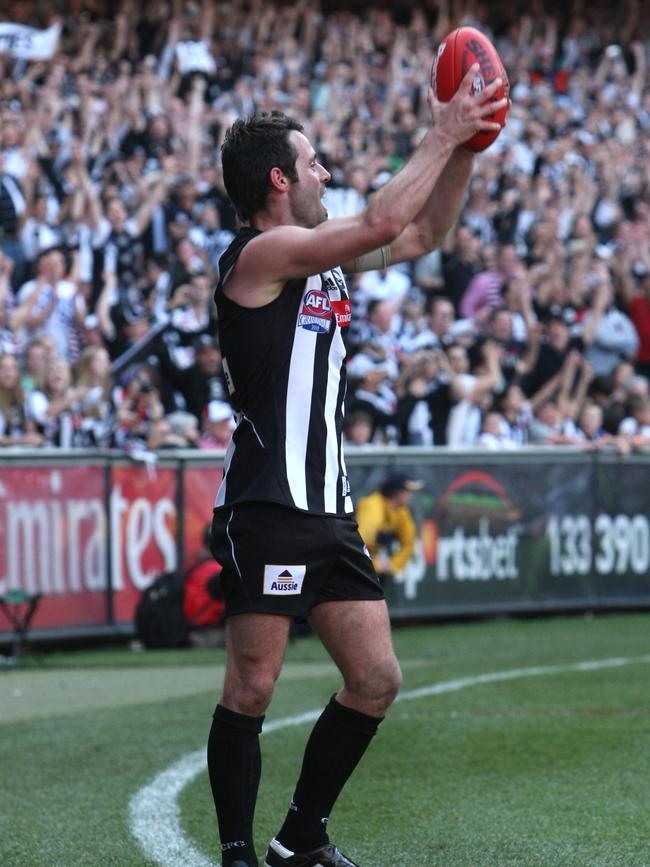
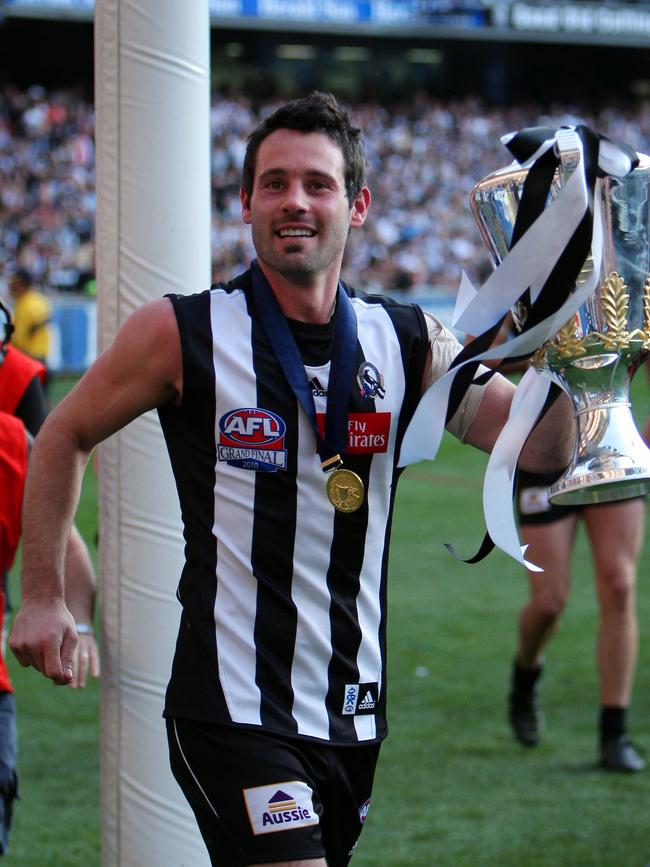
HM: That was one of your four career tackles.
AD: (laughs) It was and three of them were in warm-ups! I was worried. I remember running off the ground and I could just feel my pec moving from side to side. I came off and said to the doc, “Mate, I’ve ripped my pec off the bone”. We went down the race, he checked me and knew I was in a bit of trouble. That week was nerve-racking. We went to see a surgeon in Kew and he said that we either go in for surgery and end the year, or continue to play through the pain. He said: “It’s going to be tough early on, but every week it should get better and better once you rip all the scar tissue off. At the end of the season we can do surgery, but it’s up to you.” I told him that I wanted to play, so we went back to the club, convinced the docs, medicos and the coaching staff that I could play. I’d have a week off and then play against the Bulldogs. That week and the week after, the pain was close to unbearable, but I knew if I could get through it, we had a group that could win the lot.
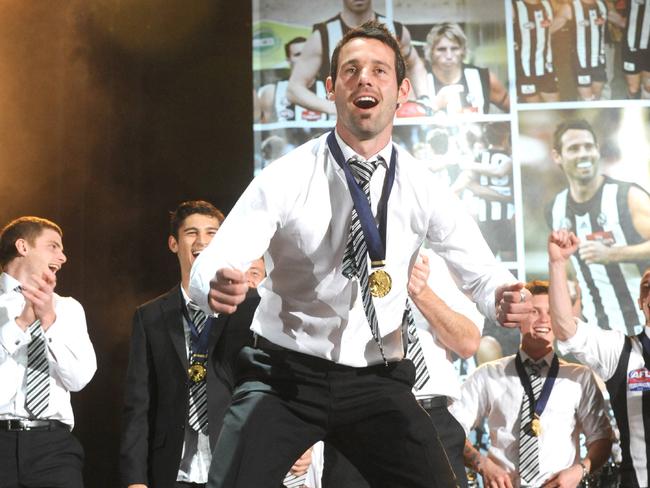
HM: Did winning the premiership live up to all of the dreams that you had as a young
kid growing up in Pooraka?
AD: It did. And more. Winning the premiership was great for us as players and a club, but the joy you could see it gave the supporters who’d waited 20 years for one was a big part of why it was such a thrill. For me though, it forged a mateship with the playing group, suddenly you had a bond with friends for the rest of your life. We all catch up regularly still, and we don’t really talk about the game, we talk about things we all shared off the field. We all have a drink and a laugh and remember it all.
HM: Speaking of having a drink — you had a couple of nights where you had a drink and
they came back to haunt you.
AD: I did, I did. The night with Heath Shaw almost cost me my career.
SUBSCRIBE TO THE SACKED PODCAST HERE
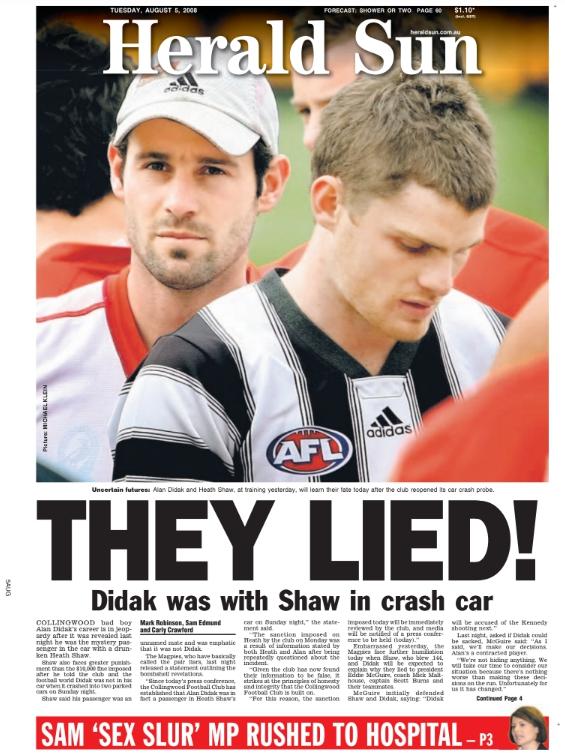
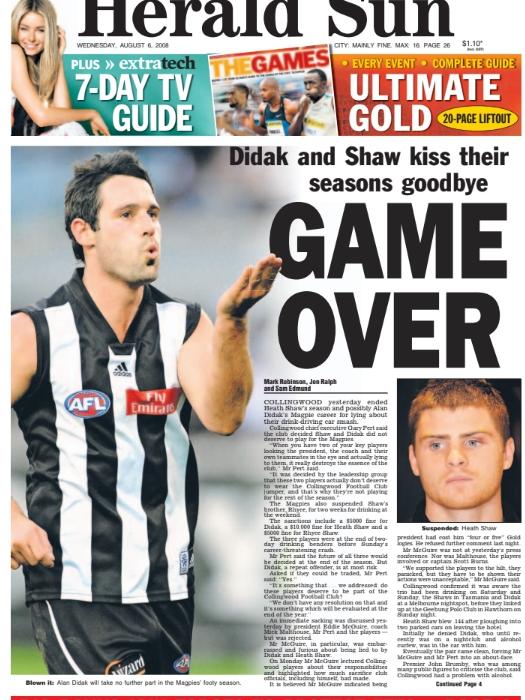
HM: How close were you to being let go by the club?
AD: From the chats I’ve heard took place, I was very lucky to be allowed to stay. There was definitely strong discussion around moving me on, and keeping Heath, because I had a little bit of history prior to 2008 as you know, which we can leave alone. But once all the dust settled, the key figures at Collingwood knew I wasn’t intentionally trying to hurt anyone, or damage the club. My heart was in the right place, it always is, and they could see that I wanted to be a part of the club forever. I’m so grateful they didn’t push me out.
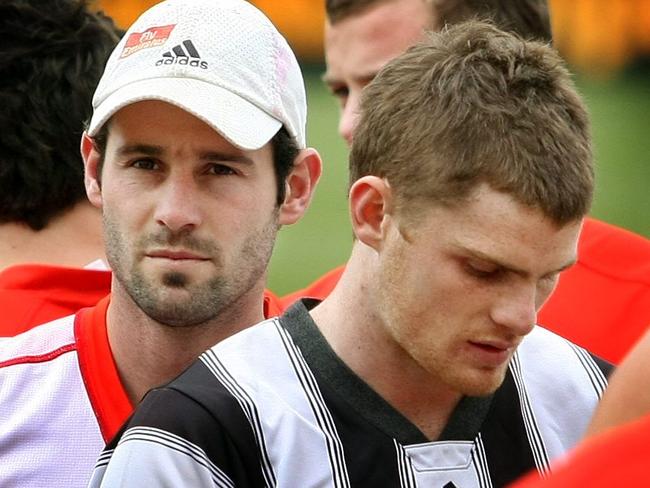
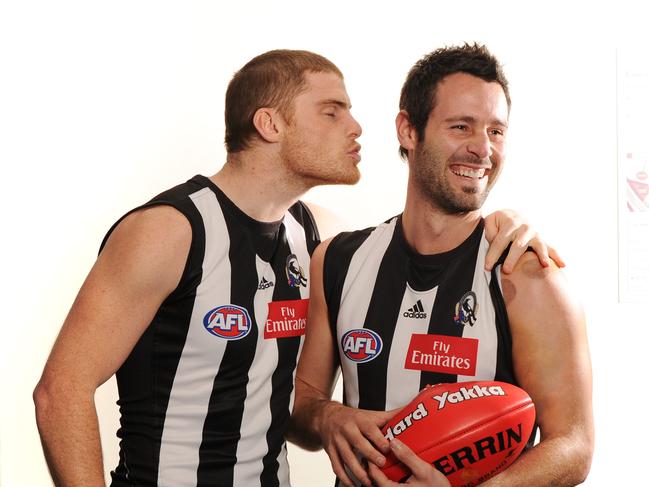
HM: The friction came from you saying you weren’t a passenger in the car that Heath Shaw crashed while driving under the influence, but you were. Is that right?
AD: Sort of — I’d like to clear up a few things as I’ve never really given my side of it all. That night, when I jumped in the car with Heath after a few drinks at the Geebung Polo Club and we crashed into the cars, we were always going to tell the club. Our intentions were to tell the club straight away. After Heath came home from the police station, he came to my house and we tried to ring two or three people from the club. It was around 11pm and not surprisingly no one was picking up. Heath went back to his house and slept on it, as did I. The next morning Rhyce Shaw picked us both up, took us into the club and we talked about the situation together. I said to the guys, “Make sure you tell them that I was in the car”. Heath said, “Let’s just see how it goes and we’ll make a decision. I’m happy for you to say you weren’t in the car, because technically you haven’t done anything wrong and don’t need to be implicated in it all. You were with me, I was the one caught drink driving and I was
the one who crashed into the cars, you don’t need to be brought down by me”. We went into the club and I was thinking he’d just tell the club everything that went on as it happened. Heath was rushed into a meeting and he was in there for about an hour. I had no idea what he’d said in the meeting, and directly after that meeting, he went straight into a press conference.
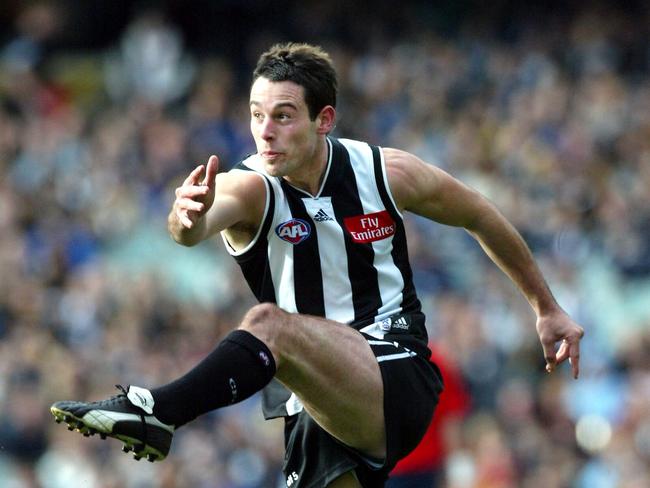
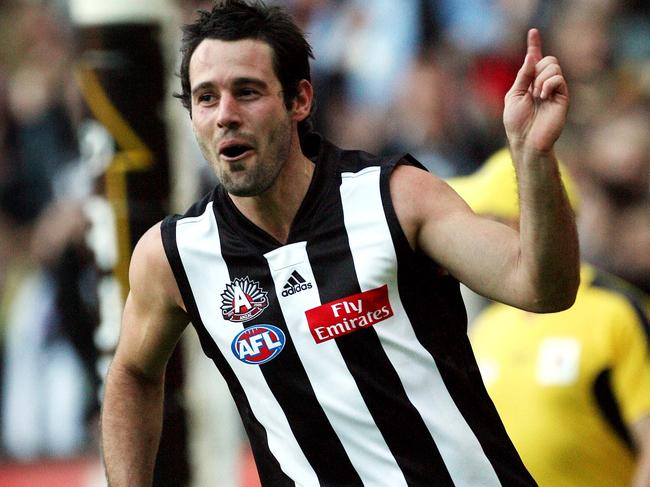
While the press conference was on, the rest of the team were getting ready for training. Halfway through the press conference, Simon Lloyd, who was our psychologist at the time, came up to me and said, “Were you in the car?” And I panicked and said, “No, I wasn’t”. I didn’t know what Heath had told Eddie and the board, or what he was saying in the press conference. Afterwards Heath came out and said, “Mate, the whole press conference was about you being in the car!”. I said, “What did you say?”, and he said, “I said it wasn’t you in the car, it was a mate”. I knew then that we were in a little bit of trouble. We tried to brush it off, went out and trained, and as I’m walking out to training Eddie was doing a press conference and I could see he was getting a bit agitated. Halfway through training he’s called me off the track, and he’s said, “Dids, were you in the car?” I’m thinking, “Far out, what do I do here? Heath has told me in the press conference that he said I wasn’t in the car. I’ve told Simon Lloyd I wasn’t, I want to tell him the truth but I’ll let Heath down now and I’ve already lied to Simon … I’m buggered here”. Again, I panicked and said, “No, Ed. I wasn’t in the car”.
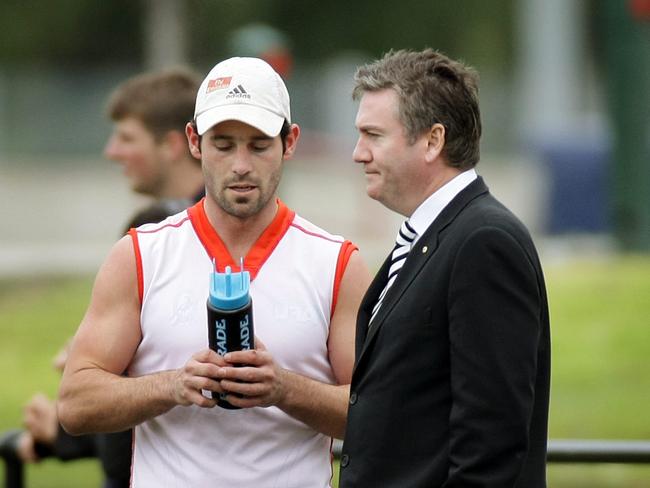
HM: And from there?
AD: After training, there was no mention of it, I showered and went home. Heath and I talked all day, for hours, we would have spoken 20 or 30 times. It didn’t sit comfortably with him that he’d lied, nor me, and I said, “Mate, at the end of the day, if you don’t feel comfortable with it, I’m happy for you to say I was in the car”. Still, at that time, I thought, while we could have told them earlier, I wasn’t the one drink driving, and I wasn’t the one who crashed. I was just the passenger. Heath said “OK. I’m going to tell Ed”. At about 3.30pm Eddie found out and by 4pm I’ve had 20 missed calls from him, demanding that we all meet up. Our intentions initially were to tell the club, but as time went on, Heath was trying to stick up for me as a mate. We paid a hefty price for it in the end.
HM: Isn’t it funny how a small slip, or a bad error of judgment, just implodes so quickly. We’ve all been there and you think, “Just give me that moment again!”
AD: No doubt. You’re young, naive and stupid … not a great mix. It was a situation where we could have just told the truth, copped our medicine and it would have all been so much simpler. I can remember when we had the meeting at 4pm at Heath Shaw’s house with Perty (CEO Gary Pert) and Ed. Eddie was absolutely fuming. He was more angry at the fact that we’d lied to him, and embarrassed him, because he’d backed us, and we made him look like an idiot. We made the club, and Eddie, look like fools. I really regret that. If we had our time again, we would have done things very differently.
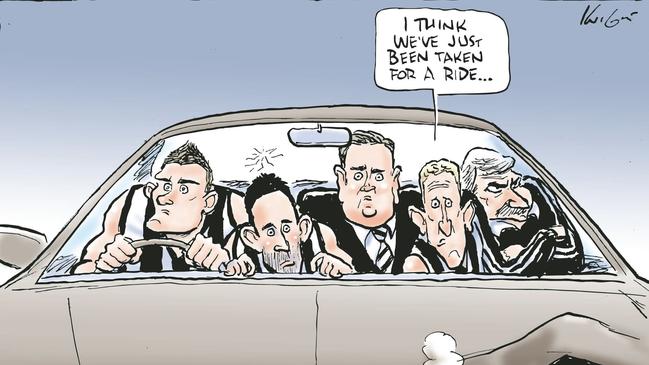
HM: You talk about mateship — a group of you all became known as the “Rat Pack”. Who gave you the name?
AD: There were a couple of players playing up at the club, and believe it or not, it wasn’t me this time … I was having a rare “good spell”. I remember Perty was doing a press conference, and he said, “There’s a few rats at the club at the moment that we’re not happy with”. The Herald Sun ran with it and the next day on the front page there were six or seven rats with our heads on them. That’s where it all started. Before then, there was no talk of it. We were a tight-knit group who liked to have fun on and off the field, and it sort of suited us I think.
HM: Dane Swan wore it as a badge of honour and has said: “You had to be consistent on and off the field. You needed a couple of things on your rap sheet, or you didn’t qualify.”
AD: That’s about right! Swanny was the pin up boy for the Rat Pack. Our spiritual leader … it’s funny when you look back at all that stuff now — a throwaway line in a press conference and a tag gets applied and sticks.
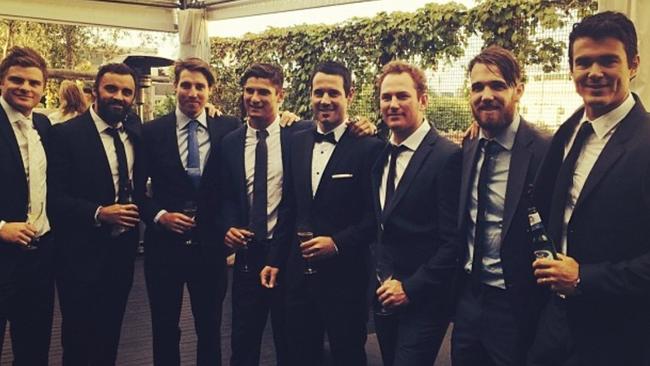
HM: The football rumour mill is always strong. One of the things that was bandied about was there was a cultural problem at Collingwood late in Mick Malthouse’s tenure — you’ve got a completely different view, don’t you?
AD: Definitely. I laugh at that. I just don’t understand it. Mick wasn’t just an AFL coach, he was a father figure, a mentor, and everyone looked up to him. He just made time for everyone and he understood people from all walks of life. We had players from all over Australia and he made a real effort to look after players who he thought needed more than others. The culture was great. We had good people all around the place and a lot of those people are still in footy and regarded as the highest people in footy. David Buttifant was a fitness guru, one of the nicest guys going around. Neil Balme early days, Geoff Walsh. They wouldn’t put up with or allow a cultural problem to develop or fester. We had a winning culture. We trained hard, but it’s fair also to say some wanted to have a little bit of fun off the field, but that wasn’t a cultural issue. We played off in five Grand Finals in 13 years, so we were doing something right!
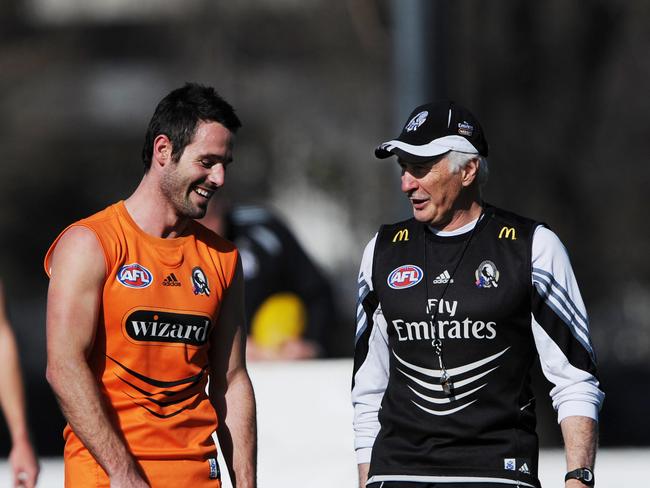
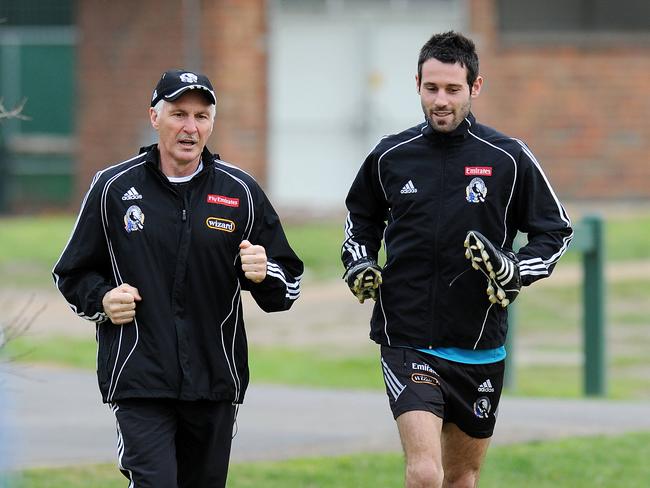
HM: You retired in 2013. Have you played since?
AD: (laughs) I did the rounds! My first year out I ended up playing seven games, doing a couple of country gigs, and played a few games in Tasmania. Once I realised that I was too old for it, and the young fellas were running rings around me, I gave it up pretty quickly.
HM: It’s amazing how fast, you get slow! What do you miss most about the AFL life?
AD: The camaraderie and banter with the teammates, being around the club, in the changerooms, training, playing. The most important thing that I miss is being around my old teammates. And Anzac Day. It’s such a special day and we were only a small part of it, but every player looked forward to playing on that day.
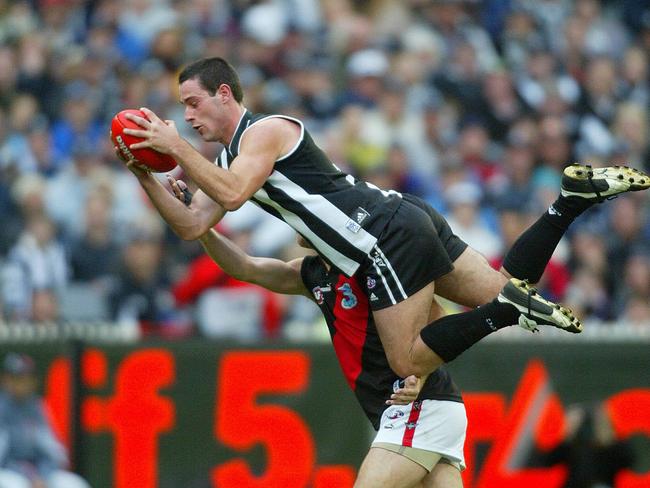
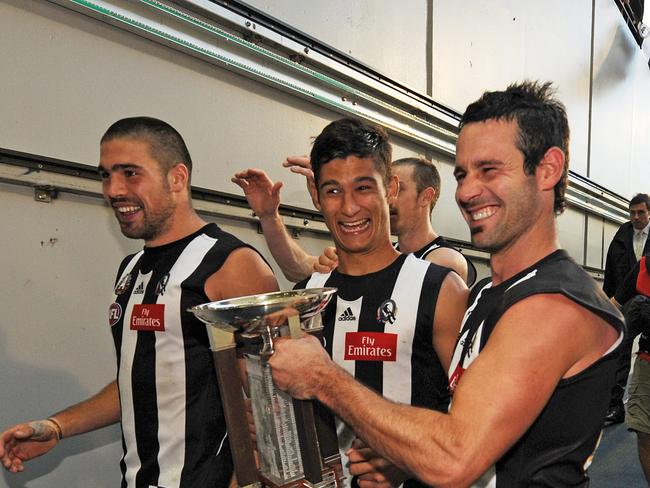
HM: Mick really took upon himself to educate the group didn’t he?
AD: Yeah, Mick used to love the old war stories, and loved history in general to be honest, but Anzac Day was his. He made sure we’d go down to The Shrine and he’d have war veterans come in and tell their stories. It was a really special week for Mick, he enjoyed it and we benefited from that. I’ll never forget one year, he read a letter out, and after he’d read, we all just wanted to run through brick walls and didn’t want to let anyone down. It was very touching and very motivating.
HM: Biggest learnings out of footy?
AD: Don’t take it too seriously. A lot of players get caught up thinking it’s the only thing out there, you get caught up in the bubble, so keep it all in perspective. Enjoy it, because, gee, it does go quickly.
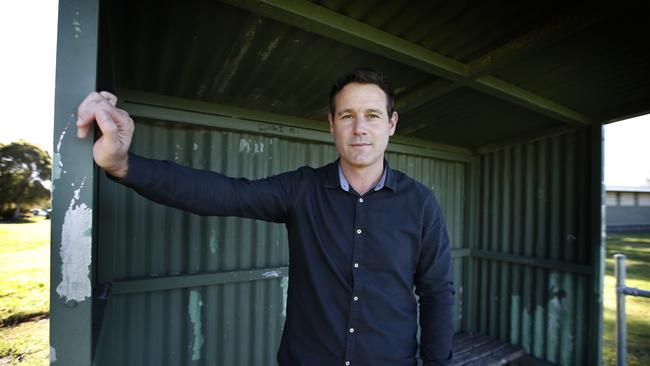
HM: Do you find it ironic that the fittest Dane Swan has ever looked is in the jungle?
AD: (laughs) There’s not too much you can eat in the jungle is there?
HM: He’s a good eater?
AD: He’s a very good eater. He doesn’t skip meals when we’re out and about. He’s looking pretty trim at the moment, he can’t go out much with lockdown. He might be the healthiest he’s ever been!
HM: If somebody said describe Dane Swan, where do you start?
AD: The most relaxed guy that I’ve ever met. Nothing fazes him. He’s a good fella who’d do anything for you, who loves to have a good time, loves socialising and loves being around people.
HM: How did you settle into life post-footy?
AD: It was a struggle initially. I felt lost for the first year, maybe a bit longer. I had no idea what I wanted to do, because the structure and what you know, just gets taken away from you. I was lucky that I had a beautiful, supportive wife, and one young one at the time to keep me busy. I was pretty lost. Now, I’ve got three little ones that keep me on my toes. I’m working away at my own transport company and I have really good mates around me. We catch up regularly.
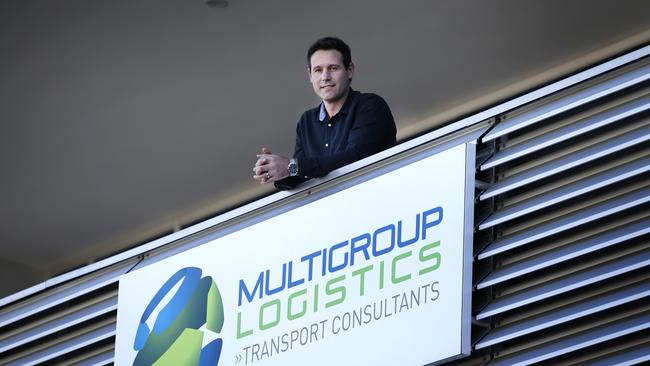
HM: Has the structure of sport helped you with your business?
AD: Definitely. I’m very fortunate that one of my mentors pointed me in the right direction in regard to life after footy and I hope I’ve made the most of it. I’ve found business is like the workings of a football club — if you’ve got structures in place and get the right people around you, it’s amazing how well the company can work.
HM: Are you playing an effective role in home-schooling?
AD: (laughs) A little … I lasted half an hour on the first day and in the mornings now I’m off to work. A little bit of sport and light reading in the arvo sees me out.
HM: I knew I was in trouble when I was trying to work out long division with my year two daughter and was battling. I’ve had horrible flashbacks!
AD: I’m similar — I’ve forgotten a lot of what I learnt in school. I try not to get caught showing the kids how much I don’t know! They’ll start to second guess me!
HM: We are in similar boats. Thanks for talking, I enjoyed it.
AD: Cheers mate, same.
